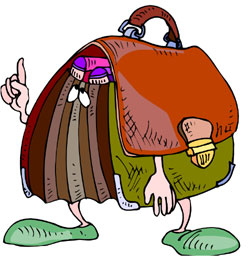
 |
Job CategoriesArticles |
Create a career portfolio
Angela de Freitas
Contributor Do you remember when a portfolio was something which art school graduates proudly lugged around, as they glowingly showed off the best of their creative works? Well, times have changed. The art school portfolio has now evolved into a 'career portfolio', which is recognised as an essential tool for any job seeker. Savvy job seekers think of a career portfolio as their very own portable collection of papers, documents and essential job and education-related tools and/or artefacts presented in a variety of formats. 
CUTTING EDGE A career portfolio can also be considered as part of your self-marketing arsenal, an extension of your résumé and cover letter and something which you can take with you to an interview as proof of your achievements. A career portfolio will bring life and interest to an interview and may just give you the edge or another candidate. As you build a career portfolio, you will realise that you understand and know yourself much better. You will thus be able to answer interview questions much more confidently as you have brought together information about yourself, your aspirations, interests and your experiences. To a question - 'What past experience do you have which would make you best suited to this position?', you will not only have an answer but, in some cases, you will have proof as you will be able to pull this out from your portfolio. Now that you know just how important such a tool is, here's a heads-up on what it's all about. PORTFOLIO ESSENTIALS Age is not a binding factor where a career portfolio is concerned. If you do not already have a career portfolio, you can create one now. Your portfolio should include:
BENEFITS How will all this help, you may ask? Having these things together in one place will help you to make good job-hunting decisions based on information you have gathered about various professions, companies, the labour market and trends. You will also be able to keep important information together relating to your personal career aspirations and goals, and educational opportunities. When you create, keep and maintain this career portfolio, you will be able to: reflect on your past achievements - analyse and plan the best way forward - identify your own personal career development requirements and know which opportunities you should be looking out for - offer proof to a potential employer of what you say you have done in the past and your personal achievements - plan, appraise and track learning experiences. PORTFOLIO HARDWARE What should a career portfolio look like, you may ask? Your portfolio can be a folder, other 'holder' of some type, maybe with inside pockets and tabs for labelling different sections - job, education, life goals, etc, or it may have transparent pockets in which to place items. Add to your career portfolio as time goes by and you will have a valuable tool to assist you on your career journey. Remember that when you have a job, that's not the end of the life of your portfolio. You never know when you will be job hunting again, so keep it up to date at all times. You can also update it to have a record at hand as a reminder for you and your supervisor of what you have achieved and special projects you have worked. You will be happy for this when it is time for internal on-the-job evaluations. Angela deFreitas is general manager, CHOICES Career Advice, and publisher/editor of 'CHOICES Career & Education' magazine, www.choicesonlinejm.com. She can be contacted at info@choicesonlinejm.com |
|
© Copyright Jamaica Gleaner
|